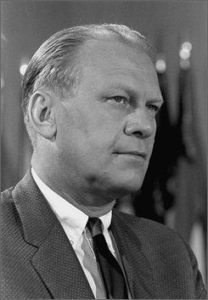 Shortly after he was elected Republican Leader of the House of Representatives in 1965, then-Congressman Gerald Ford was asked a simple but straightforward question:
Shortly after he was elected Republican Leader of the House of Representatives in 1965, then-Congressman Gerald Ford was asked a simple but straightforward question:
“What is the mission of the minority?”
Ford’s response was equally straightforward:
“The mission of the minority,” he declared, “is to become the majority.”
Not surprisingly, Ford was immediately criticized for his remarks. “There were outraged screams from several Democrats in the House,” he recalled in a speech at Tulane three years later. “This, they said, was a narrowly partisan point of view. This was evidence that I was so hungry for power that I would place party before country.”
No doubt there would be a similar reaction if a Republican Leader in Congress were to give a similar speech today. Indeed, Mitch McConnell was lambasted for an interview he gave shortly before the 2010 mid-terms, when he said his “top priority” as Senate Majority Leader would be to make sure Barack Obama served no more than one term as President. And yet to the extent that politics is ultimately a competition between two governing philosophies, one could argue that the top priority for all elected officials should be to make sure that their philosophy ultimately prevails if they truly believe the country will be better off as a result. The key, of course, is how to go about achieving this goal.
In his 1968 speech at Tulane, Ford offered his own thoughts on the matter. Explaining why he believed Democrats were so outraged to learn that the mission of the minority was to win the majority, the future President stated, “I personally believe they were simply startled to find a Republican with the audacity to think his party could regain control of the Congress and to set about constructively trying to accomplish that objective.” What’s notable is that Ford added the word “constructively” to the typewritten copy of his remarks. It is written, in cursive and in presumably his own handwriting, above the line — indicating that while Ford believed winning the majority was important, he also believed it was important to achieve that goal in a way that was beneficial to the country.
In this latest edition of The Ripon Forum, we focus on that same goal — namely, how Republicans in the House, who were swept out of power by the Democrats last fall, can put their newfound minority status to use in a way that not only serves the interests of the party, but the interests of the American people, as well. Leading our coverage of this topic is veteran House Leadership aide Michael Johnson, who provides advice to the House GOP on how they can go about “Making the Minority Matter.” To the extent that suburban support for GOP candidates is at or near an all-time low, Republican Main Street Partnership President Sarah Chamberlin Resnick offers her insights on how the party can go about “Winning Back the Suburbs” next year. With only 13 Republican women serving in the House, strategist Cam Savage explains why “Building a More Diverse GOP” will be critical for Republican fortunes next year. And with Democrats raising 30% more money than their Republican counterparts in the 2018 mid-terms, former NRCC Chairman Tom Davis shares his thoughts on GOP efforts to level the financial playing field and how the party can be more competitive in 2020.
As part of our recurring Beyond the Beltway feature, Mayor Dee Margo delivers some “Straight Talk from El Paso on Border Security & Immigration Reform.” With the national debt topping $22 trillion for the first time in U.S. history, Maya MacGuineas, the President of the Committee for a Responsible Federal Budget, has a blunt message for those who claim that rising red ink will be washed away by continued economic growth (hint: it ain’t gonna happen). California-based political consultant David Wolfe takes a look at the practice of ballot harvesting and explains why, with reform and proper oversight, it can serve the public good. In a special report Ed Goeas and Brian Nienaber of the Tarrance Group analyze the results of The Ripon Society’s Annual Survey of the American electorate. And in our latest Ripon Profile, newly-elected Congresswoman Carol Miller discusses her priorities in office, and how the service of her father, the late Congressman Samuel Devine, has shaped her own political career.
As always, we hope you enjoy this latest edition of The Ripon Forum, appreciate your readership, and welcome any thoughts or comments you may have.
Lou Zickar
Editor of The Ripon Forum
louzickar@clu.ccw.mybluehost.me




